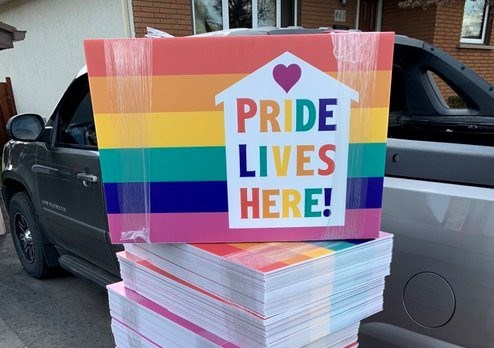FORT FRANCES – A ruling from small claims court of the Ontario Superior Court of Justice has awarded the maximum cost in damages to Borderland Pride as compensation arising for the defamatory social media comments made by Fort Frances resident Luke Cawston.
Cawston must pay Borderland Pride $35,000 in general damages plus fees, according to Douglas Judson, Borderland Pride’s chair.
Back in March, the town’s SIJHL team, the Fort Frances Lakers, partnered with Borderland Pride to host their first-ever “Lakers Night Out” Pride Night event. Along with the hockey game, the event would also feature drag performers.
However, not everyone was happy to see the minor league hockey team celebrating inclusivity and diversity in sports.
Cawston took to a Fort Frances-area Facebook group to voice his disdain on a post advertising the event. He wrote crude and defamatory statements accusing the Pride organization of being "diddlers" and "child predators" who were organizing a "pedophile show," as stated in the court case.
"Unfortunately, these types of events continue to be the target of a lot of hate and prejudice in the community and online," Judson told Newswatch.
"This one was no exception. One individual took it upon himself to describe Borderland Pride, myself, and my partner who are organizers with that organization as 'diddlers,' people who are engaging in sexual predation targeting children or promoting sex to children.
“We do not do any of those things. Those types of comments are patently defamatory and they, particularly, are terms that have been weaponized against the 2SLGBTQIA+ community historically to characterize this as dangers to children or as pedophiles.”
Judson said he repeatedly cautioned Cawston that his comments were liable in court.
In December 2023, a Thunder Bay judge ruled that anti-SLAPP law did not protect defamatory statements on social media. SLAPP refers to ‘strategic litigation against public participation, ’ in which the law, essentially, was created to strike a balance between free expression and reputational harm, and prevent litigation from being used to limit expression on matters of public interest.
The dismissal of the law by the judge set a precedent that hate speech on social media is not protected, which opened the floodgate for litigation cases such as the Borderland Pride et al v. Cawston court ruling.
In May, an Ontario Superior Court Justice ruled in favour of Borderland Pride, Judson, and his partner Peter Howie after Cawson failed to defend his comments in court.
Judson said he was pleased with the victory because of what it represents on a larger scale.
“We brought the case not just for its own sake, but because we see a lot of this hate online. Not just locally but in other places in the province and across the country. We wanted to make an example of people who engage in this conduct and to also light the way for other members of our community who are experiencing these types of smears online and show them that there are tools to deal with it,” explained Judson.
He said an award for damages could have been higher if the case was escalated to the Superior Court, where false allegations or defamatory statements of sexual wrongdoings range from $30,000 to $75,000.
This case further highlights that the small claims court is an effective process for those seeking justice in a political climate where violence against the 2SLGBTQIA community is on the rise.
“I don't think it's a secret that the weaponization of hate targeting the queer community has been on the rise for the past number of years, at least the last four or five years and particularly from the political right. We're seeing a lot of this groomer rhetoric arise," Judson said.
"We're seeing a lot of attacks, particularly on the trans-community, on people who perform drag on people who are gender diverse or are transitioning.
“And, that expression has, I think, a political motive. There are a number of statistical studies out there, and I'm aware of them because I've referred to them in other litigation work I've done, where organizations have noted the direct link between the expansion of online hate targeting the 2SLGBTQIA+ community and actual incidents of violence.
"And, you can draw a straight line between those events. We are seeing a pattern where online hate is giving rise to offline violence. It's important that we not allow people to terrorize a vulnerable group in our community and that we demonstrate there are consequences for engaging in defamatory expression.”
Judson acknowledges as a lawyer he is not afraid to take someone to court who engages in spouting hateful rhetoric online. The normalization of hate speech that has populated online community spaces has, for far too long, resulted in real-world consequences of violent action against people.
This case sets a precedent that enough is enough.
“Those of us who do this work have realized that we need to push back on this type of attack with force and we need to impose consequences,” Judson proclaimed.
“As a lawyer who does this work that means I'm going to start taking people's houses and their vehicles and their toys and draining their bank accounts and garnishing their wages because no one is going to stop behaving this way until there are real consequences. Until there's real financial pain that attaches to it.
“We're going to keep doing that. Hopefully, the message will eventually get through that you have free expression, but that doesn't mean freedom from consequences.”
